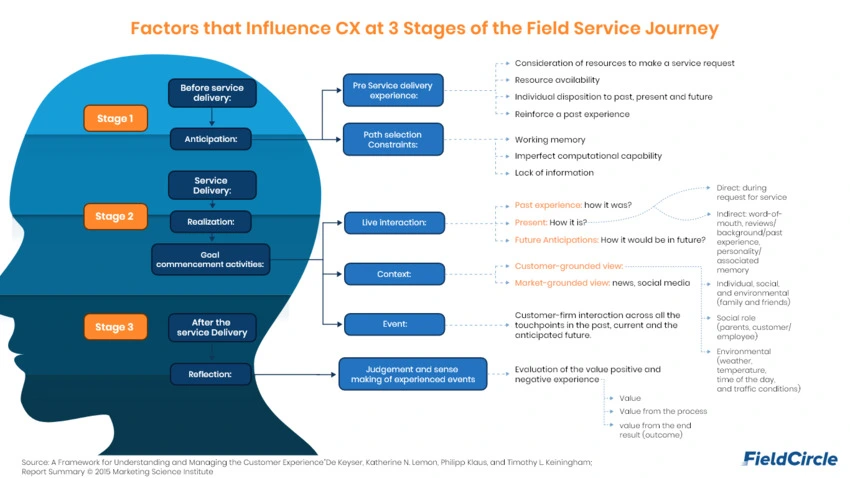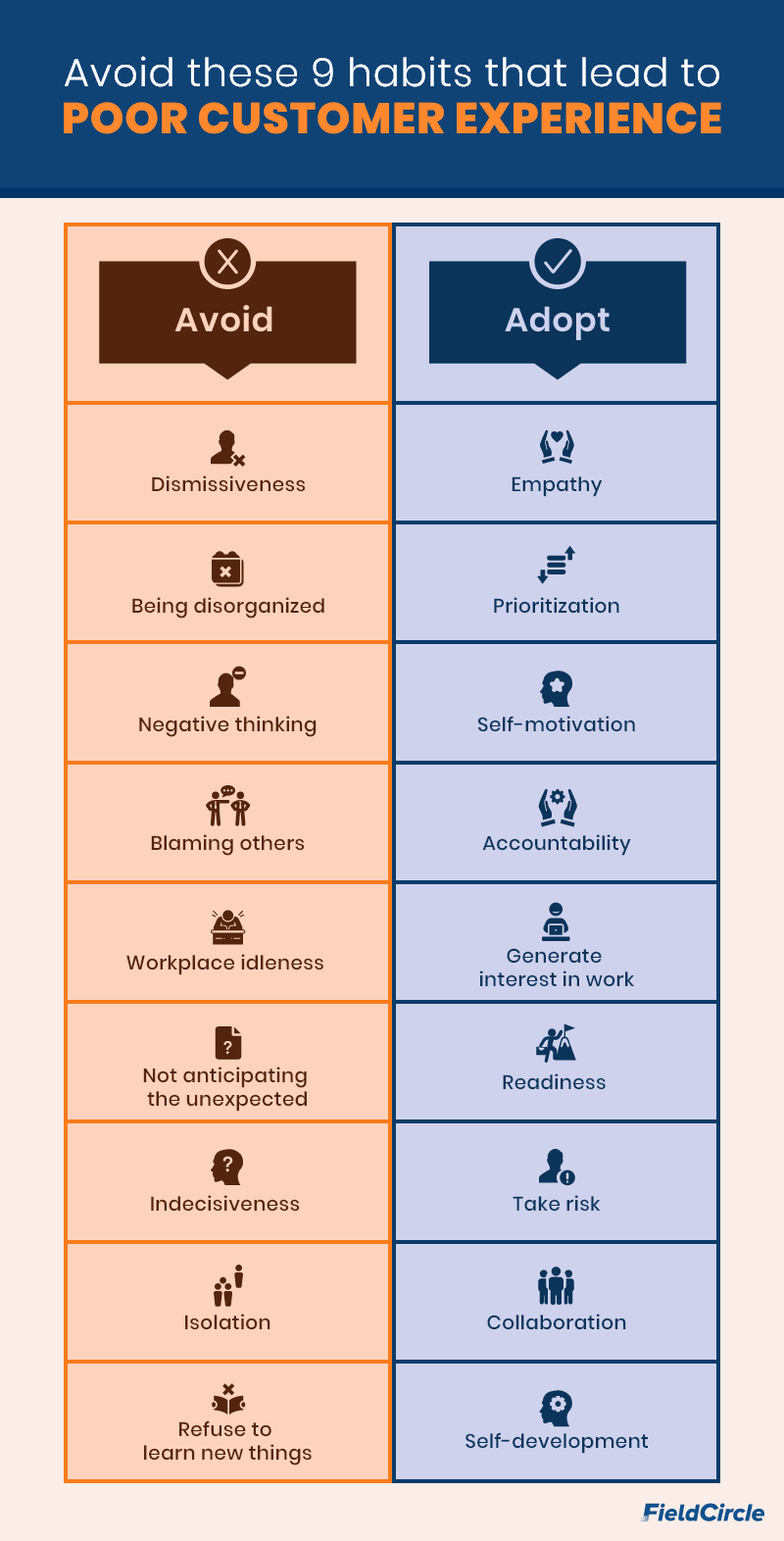9 Habits of Service Technicians That Affect Customer Experience Negatively

Your strategy was awesome. Your priorities were set and communicated to the team. You chose the best metrics and used the best of the tools. Your service and maintenance team was working hard. Yet, when you tally the customer experience scores, you found that numbers were not even close to your estimates. Even after having the right tools like a comprehensive field service software or a robust CMMS program and other technologies in place!
Does this sound familiar? Well, far too many executives share the same results.
The hunt for factors that led to poor customer experience could be difficult, mainly for two reasons: one, that customer experience has a broad and holistic nature. In that sense, identifying what miffed the customers in the present or in the past that made them write a poor review or discontinue the service could be tricky.
And second is experience is personal and unique to everyone. That means the problem you have identified with one customer may not be the problem of another.
However, your service technicians’ activities may leave a trail, following which you could uncover what went wrong. In other cases, technician behavior might be the very reason for poor customer experience.
But can you keep a tab on the technicians’ behavior?
Especially when CX comprises a range of “cognitive, emotional, physical, sensorial, and social elements,” as proven in a study by Arne De Keyser, Katherine N. Lemon, Philipp Klaus, and Timothy L. Keiningham. Tracking technician behavior in line with these elements of CX
While tracking and monitoring tools can help, tracking the behavior at a granular level and then inspiring better behavior is a far-fetched capability in many tools at the moment. They help technicians manage and reduce customer escalations in a better way.
A better and more effective solution could be cultivating a culture of CX in the workplace, which helps technicians to fully understand the elements of CX and how they affect customers. Based on the CX study by the Marketing Science Institute, we have created a framework for field service technicians that cement their understanding of CX and its influence at different stages of field service in service technicians.

As you can see, at several stages, the current experience is susceptible to past and future anticipations, along with the environmental factors, personality, and individual disposition of the customer. Field technicians in that case must be aware of every past “event” to lead the “interaction” in the present.
Digital field service software are helpful here, which could provide historical data of asset performance, equipment repairs and maintenance, service requests, and payment, allowing them to evaluate various options in the current service scenario. However, it is up to the technicians to make the best use of the information to drive their own actions, especially in the field when no one is watching.
Often technicians’ efforts may get affected by constraints, ranging from past experiences, workload, poor soft skills, personal biases, and inaccurate assumptions. When we talked to field service leaders about such constraints in the light of CX, they pointed out a unique problem these constraints, when left unchecked for a long, developed into habits and lead to poor customer experience. While soft skills in technicians and service engineers remain of the biggest factor and you may read more about 10 technician soft skills that could have a transformative effect on your business, there are other factors and habits dragging the business down.
They specifically pointed out these 9 habits, which easily get disguised as “way of work” but impact the customer experience.
1. Too full of their own
An experienced field service technician might have seen it all; equipment failure due to human errors, physical wear, and tear, or temporary patches used in past repairs. A small hint might be enough for them to recognize the problem with the machine, probably even without using an intuitive inspection program. But for a customer, it might be a new and terrible experience.
Too full of their own technical competency and too engaged with their own upward spiral in the workplace, field service technicians often undermine the distress of the customer. “A technician has to complete 3-5 repair works in a day. It is not odd to see a sense of urgency in their behavior, but this urgency should not be reflected on customers”, said a field service manager.
Generally, this behavior starts with urgency and quickly develops into a habit. And then you would see that they are “not willing to empathize with the customers because it is a time-consuming process and requires one to be attentive and actively listen to their problems,” he further elaborates.
2. Disorganized
Field technicians cannot escape urgency though. And those who are disorganized often fail to meet the critical requirements of the tasks on time. Although companies have made significant progress in this direction by simplifying the access of information about jobs, inventory, and other aspects of the task to resolve problems faster, effective prioritization of activities is still a challenge for many technicians.
It is because being organized is not really about how you manage your job, but how you manage yourself. For instance, service managers can schedule a task properly and technicians could have mobile access to all the relevant information, but reaching the location on time and completing the job with 100% efficiency is an individual responsibility.
Technicians must learn to manage themselves, their time effectively. As any delay in problem resolution for any reason reflects poorly on customers.
3. Negative Thinking
A survey conducted by a global manufacturing company reported 30 percent low overall performance scores in 10 percent of the employees who were prone to negative interactions. A dreadful aspect of the negativity is that it spreads faster; as in negative experiences are shared to a greater degree than positive ones (Anderson 1998).
How long do you think it would take for customers to acquire the negative experiences of the field service technicians, especially when they engage in high bandwidth communication?
Negative thinking in technicians may emerge due to emotional exhaustion caused by excessive workload, poor processes, negative gossip or hostile verbal or nonverbal behaviour by the supervisor. The negativity affects the technician performance, mostly leading to increased turnaround time and poor service quality.
Installing listening mechanisms to understand the mindset of the field service technicians, take corrective actions, and provide them guidance and support to overcome the negative mindset is an instant yet long-term fix.
The use of digital tools to capture employee feedback through surveys, recommendations, and suggestions could help in addressing employee grievances before it impacts customer service—especially when combined with real time customer feedback to get a complete picture of service quality and areas needing attention.
4. Passing the buck
Do you have a technician in the team who never takes responsibility for a task gone wrong? A technician who plays a victim card too often or begins justifying in defence as soon as you raise an issue with their work?
A customer did not pick the call in time, or specific information is not mentioned in a service request, or the right tool was not available, or the previous task consumed too much time; all of these are genuine reasons to not complete the tasks. But what’s next?
Was the appointment rescheduled after a discussion with the customer? Is the service manual updated? Is the warehousing team informed about the stock shortage? It is the next step that determines the responsibility or ownership of the tasks in field service technicians, else it is just passing the buck to someone. And the real cost of this habit is a bad customer experience.
5. Slacking off
The eternal question thrown by the field service technicians to shut down the slacking concern raised by the managers is: “what is the problem if the job is getting done on time?”
A counter-question by managers could be “why is it only about the job done?” As customer service is loaded with empathy and not template based specifications. It needs a lot of focus in figuring out ways to work in the best interest of customers. Whereas slacking off indicates a lack of interest in excellent customer service among field technicians.
One of the major problems with slacking off is that it could easily go unnoticed and be really hard to assign the responsibility to someone. That a technician did not check the facts or the person did not arrive with the right tool or did not call the customer to confirm the schedule; these things happen.
The difficulty for the manager is to determine the right time to give a talking to the technician as they may show resistance. Field activity data might help here to build a case for the managers but one should refrain from being overdramatic.
6. Not Anticipating the Unexpected
Uncertainties are not unknown to field service technicians. Yet technicians develop this habit of not anticipating the uncertainties probably due to their inefficiencies in measuring the odds of something may or may not happen and prepare accordingly. Another reason could be ignorance of the magnitude of risk involved.
Since uncertainties form the very part of maintenance service, not building enough capabilities to estimate and prepare for unexpected events often leads to poor service delivery, resulting in bad customer experience and of course, impacts profitability and revenue opportunities.
However, accurate considerations of the follow-up incidents might need deeper visibility and transparency in the processes. While a field service tool could provide that and instill a greater sense of accountability, technicians must develop the right mindset to measure the likelihood for an unexpected incident to occur—one that combines analytical thinking with a customer friendly service mindset to address issues proactively and professionally.
7. Indecisiveness
Chances are a field service engineer has to make a decision at the job site with incomplete information. Or they may get to choose between two reasonable options, each having its own drawbacks. In such situations, wobbling over options is fairly common among field service technicians.
It could be because of default effects. According to Koen Smets, Accidental Behavioural Economist, it “describes our tendency to do what takes no effort.” It is like when everyone chats away in the meeting and does not come to any conclusion, he explains.
Technicians can overcome this habit with leadership support and the right set of tools and training. Field service leaders could make all such possible situations a part of the training program and train the technicians on outcome-based evaluation so that it becomes part of their decision-making process—ultimately aligning their actions with the principles of outcome based delivery to drive measurable results and service efficiency.
8. Isolation
Repair and maintenance service delivery is a collective affair. Actually field service processes are heavily intertwined, with several consecutive tasks involving multiple stakeholders that must be completed in a particular sequence.
Since technicians are a critical point of contact between the office and the field, habits like withholding information or not sharing information for validation and approval processes in time could have disastrous effects on field service operations and obviously on the customer experience.
Although technicians are expected to update information on the systems using field service app provided by the companies, most aren’t aware of the most important field service metrics, and ignorance towards the importance of information or personal reasons may stop them from updating records or being aware of what to measure.
9. Not “Sharpening the Saw”
Bruce A. Breeden, the author of The Intentional Field Service Engineer, with 37 years of experience in field service, has dedicated an entire chapter in his book on the importance of self-development for field service engineers.
A must-read for everyone beginning to start their career as a field service engineer, Breeden in the chapter stresses “learning, sharing, and developing” skills.
According to him, focusing on technology assessment helps in maximizing the “performance and potential as a field service engineer.” A technically competent engineer is not only a boon for the company but for the customers as well.
At a Glance: Avoid these 9 habits that lead to poor customer experience.

Final Thoughts
“if you are not in the field directly supporting a customer, then you need to be supporting someone who is.” And building a high-performing service and maintenance team will always depend on a lot of additional factors.
Field is a tough space, full of uncertainties. As someone sitting in the office right now, you have a chance to support your technicians with motivation, guidance, information and digital tools to conquer that space and deliver the customer experience that will win you the competitive advantage you aspire for.


